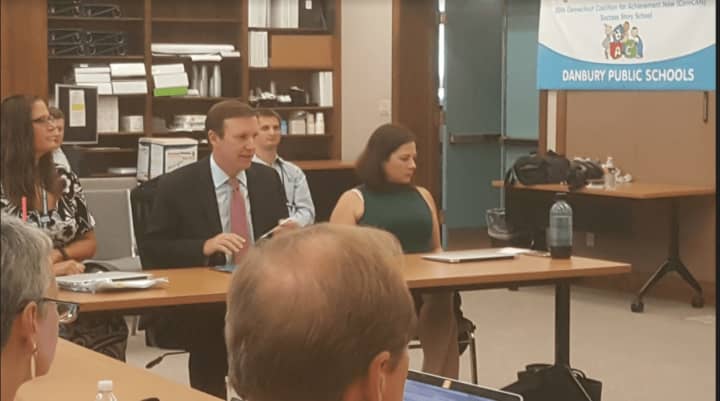Murphy's discussion included Danbury Public Schools Superintendent Sal Pascarella as well as about 20 other school administrators in the Danbury Public Schools central office on Beaver Brook Road.
The law, which Murphy helped pass in 2015, repealed "No Child Left Behind." It is aimed at improving educational achievement, reforming school disciplinary practices and supporting underperforming schools.
Under the new law, individual states and local school districts -- and not the federal government -- will be required to identify and support underperforming schools as well as decide what interventions will improve outcomes of students. In addition, the law includes no federally mandated penalty if schools fail to achieve benchmarks.
"There is a lot more latitude around how you test now," Murphy said. "You have to build in other measurements of what a good school is. You determine the measurements, what your expectations are and what the turnaround strategies are."
Under to the new law, students are still required to take standardized tests. However, all students should not be judged by the same tests, said Sandra Atanasoff, principal at the Alternative Center for Excellence in Danbury.
"Alternative school programs are popping up all over the state of Connecticut. It's often my concern that students in these programs are underserved or forgotten," she said.
Educating these students and getting them to reach these lofty measures (in regard to standardized tests) is challenging, she said.
"The students have significant issues and are well below grade levels in reading and mathematics, so it's a challenge," she said. "We are in the trenches with these students. Reaching some of these kids is difficult."
According to Pascarella, many children in Danbury can't adapt to a normal school system. "The kids' mindset of being in front of the teacher to produce work is not the same as youngsters who have a normal home life.
"Many of these kids live in different houses throughout the school year and some are living in cars. Others have been incarcerated and have come back and are trying to get their life together.
"Trying to judge all these kids with the same standards is very difficult and in some cases is counterproductive," Pascarella added.
Kara Watson-Wanzer, who works with data analysis and student outcomes for the Danbury Public Schools, said students who are not reaching their goals "need resources to help them make the progress they need to reach those levels of proficiency," she said. "The gap keeps getting larger as they move up in the grade levels."
The new law includes increased funding for early and pre-K education. Chris Pruss, director of literacy K-5 at Danbury Public Schools, said, "We have a huge percentage of preschool students who are unprepared for what's expected of them in kindergarten."
"Teachers are spending half to three-quarters of the school year getting these students prepared for kindergarten," Pruss said. Teachers then have to spend the last few months of the school year teaching students what they need to know in kindergarten, which is not a realistic expectation, she said.
Click here to follow Daily Voice Danbury and receive free news updates.




